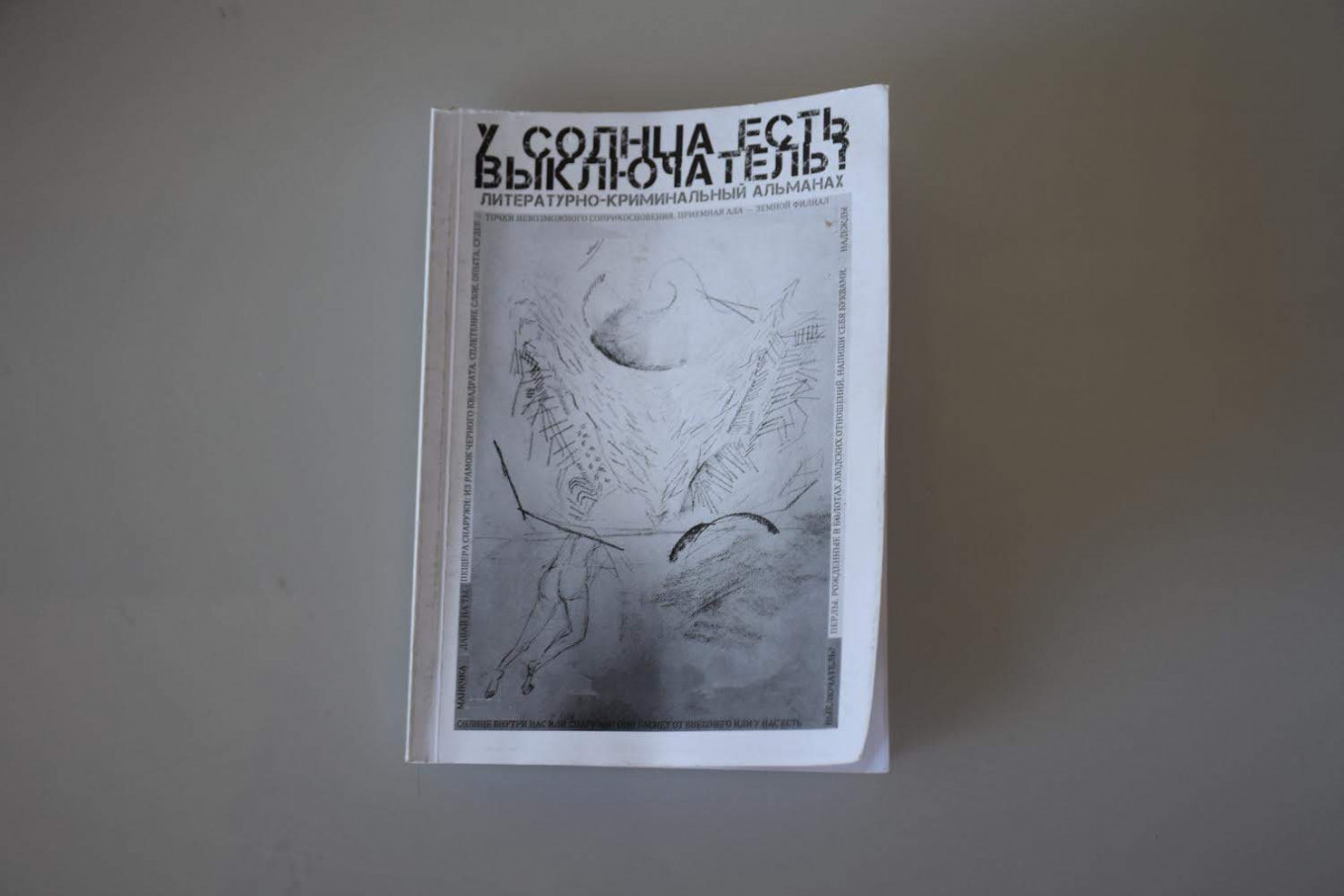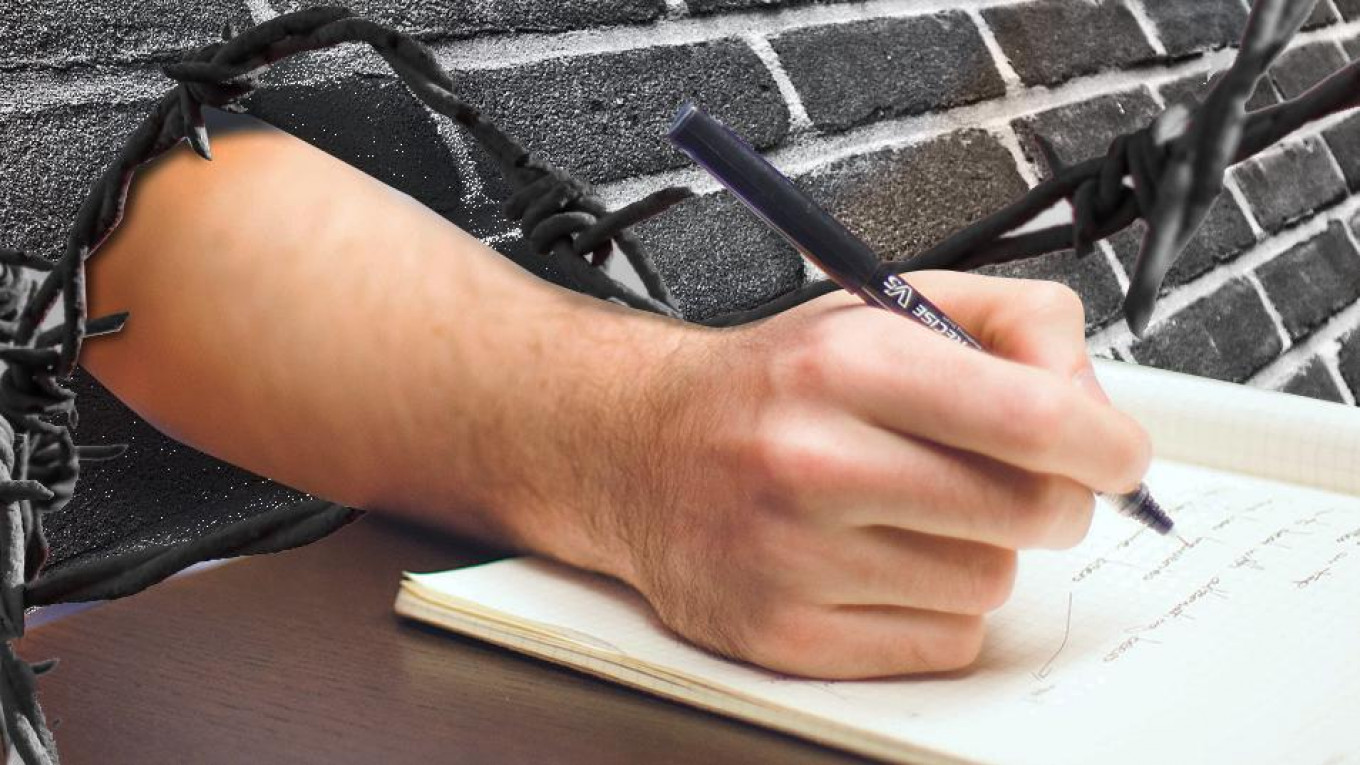In late April the Sakharov Center in Moscow was filled with the sounds of boisterous embraces and laughter. Although the wine on the refreshments table was barely touched, the mood was festive, especially when Ariella Katz, a college senior at the University of Chicago, flickered onto the laptop screen via Skype.
Katz had organized the event to present a new book, “Does the Sun Have an Off-Switch?” Many in the room had contributed to the anthology, all of whom were members of “Freedom Words,” a creative writing workshop created by Katz for those with what she describes as “prison experience” — former inmates.
This was not Katz’s first time working with people who had found themselves on the wrong side of Russian law. Katz, whose mother is from Russia, has been an assiduous critic of the Russian government’s prosecution and incarceration of opposition activists. In 2016, she was detained on Manege Square for protesting the case of Ildar Dadin, an imprisoned political activist. After receiving a warning and being released, she returned the same day with a new poster, only to be detained again.
This, however, was her first time working with “regular” prisoners. She had become frustrated that her activist colleagues put most of their energy into defending other activists, while ignoring the rest of society. “If you want liberalism to work outside the handful of people involved in Moscow and the big cities,” she told The Moscow Times, “you have to show that you care about not just activist intellectuals.” Her argument convinced the Davis Foundation to provide $10,000 in funding, and Katz flew to Moscow for the summer of 2017 to hold “Freedom Words.”
Plato, Kundera, and Hobbes
The workshop was held twice a week for two months. Katz and the participants would meet to discuss their prison experiences, creative writing theory, texts that Katz had assigned, and theater. Although many participants lacked a comprehensive education, Katz chose materials that wouldn’t be out of place on a graduate school reading list. One class, Katz recalled, was about love: “We read Aristophanes' speech in the ‘Symposium’ and we contrasted it with a passage from Kundera’s ‘Lightness of Being,’ and then we wrote our own love letters.”
Katz has a minor obsession with Plato. The anthology of writing that came out of the workshop, “Does the Sun Have an Off-Switch?” begins with five pages taken from the Greek philosopher’s “Republic.” When she was arrested in Moscow during her Dadin protest, the police asked her if anyone “put her up to it.” She responded that Plato had. She writes, in the section of the book devoted to describing the 14 dramatis personae, or participants, of Freedom Words, that she created the workshop with the “sole goal of making everyone read Plato.” Plato could have been the honorary fifteenth member of “Freedom Words.”
The format of the book has much in common with Plato’s dialogs. Each small story is followed by a number of materials which respond to the piece, creating a back and forth between the authors and the rest of the group. Katz calls this “polyphonic writing.”
“One of the theoretical directions I took this from,” she explained, “was that of putting voices together to construct a bigger ‘I.’” This approach leads to a collection of materials that is far more than sum of its parts. It doesn’t read like an anthology of 14 different authors, but more like a diary, an intimate view into the workshop itself.
Politics of the Prison System
One of the most difficult parts of the whole process, Katz explained, was finding a publisher for the writing that came out of the workshop. She placed much of the blame on the political climate in Russia, where many turned down the project due to perceived political elements. When she did find a publisher, they only agreed on the condition that they would remain anonymous, and the book does not contain any reference to them.
The book, however, does not seem overly political or oppositional. In fact, Katz, who usually wears her political allegiance on her sleeve, was surprised to find herself defending the book from friends who asked her when she began writing “pro-Putin propaganda.” She explained that she was trying to present as wide selection of viewpoints as possible. “If it’s just a bunch of moderate liberals like myself, it’ll make for much flatter writing.”
There is, however, an undeniable political element to what she’s doing. “I have a very pointed aim of elevating voices that are systematically marginalized by a prison system that really breaks people’s lives. We have a goal of making that system better, which is unavoidably a political goal.”
In Russia, there are relatively few organizations devoted to helping prisoners. One of them is Russia Behind Bars, where Katz found support, two volunteers, and some participants for her project. Katz’s niche is helping with the transition out of prison. “You might think the worst part is behind you,” Katz explained, “but it’s really disorienting.” There is virtually no support system for Russians coming out of prison, and Katz based her workshop in part on similar ones in the United States, where such opportunities are more common.

Healing After Prison
The participants were grateful for the role the workshop played in their healing process. Alexander Margolin, who wrote an account in the book about the day he was released after three years in prison, called the workshop a form of “group therapy.” Sergei Yegorov, who spent a total of eight years in the Russian prison system, said that “you just want to speak, to say that you’re not a second class person.”
At the presentation, everyone fought for Katz’s attention. One participant earnestly presented a bouquet of white flowers radiating around a central red rose, symbolizing Katz. Unfortunately the Skype connection had cut off, and she missed the gesture.
Once everyone was seated and more or less quiet, participants began to read their stories. Margolin spoke about the ambiguous feelings he had on the day he was released from prison. Yegorov read his story about a romantic liaison with a female prisoner in a neighboring cell. One woman, Oksana Krutitskaya, recited some upbeat poetry. Another man, Ruslan Akhtyamov, digressed for 15 minutes at the microphone before he had to be stopped. Overall, the participants avoided the darkest aspects of their prison experiences. Yegorov explained that “in all that filth, people look for something bright, kind.” It seemed like their healing process was going well.
To Be Continued
Katz recently heard back from the Fulbright Program that she has received a grant to continue her work after she graduates. She is planning to work, at least in part, with the same group of people in a series of three seminars. The participants were thrilled that they will be able to continue working with Katz and to get back together as a group. The presentation was the first time that many had seen each other since the previous summer. “We all literally embraced each other,” Yegorov said. “I will be very happy if this project continues.”
“Does the Sun Have an Off-Switch?” is for sale at Falanster. 12 Maly Gneznikovsky Pereulok. Metro Tverskaya. +7 (495) 749 5721. falanster.su
A Message from The Moscow Times:
Dear readers,
We are facing unprecedented challenges. Russia's Prosecutor General's Office has designated The Moscow Times as an "undesirable" organization, criminalizing our work and putting our staff at risk of prosecution. This follows our earlier unjust labeling as a "foreign agent."
These actions are direct attempts to silence independent journalism in Russia. The authorities claim our work "discredits the decisions of the Russian leadership." We see things differently: we strive to provide accurate, unbiased reporting on Russia.
We, the journalists of The Moscow Times, refuse to be silenced. But to continue our work, we need your help.
Your support, no matter how small, makes a world of difference. If you can, please support us monthly starting from just $2. It's quick to set up, and every contribution makes a significant impact.
By supporting The Moscow Times, you're defending open, independent journalism in the face of repression. Thank you for standing with us.
Remind me later.






